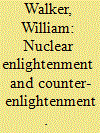| Srl | Item |
| 1 |
ID:
077687


|
|
|
|
|
| Publication |
2007.
|
| Summary/Abstract |
William Walker's article, 'Nuclear enlightenment and counter-enlightenment', raises fundamental questions about the history of efforts to construct order in international politics in relation to nuclear arms and weapons-related capabilities. However, Walker's 'enlightenment' and 'counter-enlightenment' tropes are clumsy and unsatisfactory tools for analysing contemporary policies concerning nuclear deterrence, non-proliferation and disarmament. Walker holds that in the 1960s and 1970s most of the governments of the world came together in pursuit of 'a grand enlightenment project'. This thesis cannot withstand empirical scrutiny with regard to its three main themes-a supposed US-Soviet consensus on doctrines of stabilizing nuclear deterrence through mutual vulnerability, a notion that the NPT derived from 'concerted efforts to construct an international nuclear order meriting that title', and the view that the NPT embodied a commitment to achieve nuclear disarmament. Walker's criticisms of US nuclear policies since the late 1990s are in several cases overstated or ill-founded. Walker also exaggerates the potential influence of the United States over the policies of other countries. It is partly for this reason that the challenges at hand-both analytical and practical-are more complicated and dif cult than his article implies. His work nonetheless has the great merit of raising fundamental questions about international political order.
|
|
|
|
|
|
|
|
|
|
|
|
|
|
|
|
| 2 |
ID:
077678


|
|
|
|
|
| Publication |
2007.
|
| Summary/Abstract |
Given the apocalyptic nature of nuclear weapons, how can states establish an international order that ensures survival while allowing the weapons to be used in controlled ways to discourage great wars, and while allowing nuclear technology to dif use for civil purposes? How can the possession of nuclear weapons by a few states be reconciled with their renunciation by the majority of states? Which political strategies can best deliver an international nuclear order that is effective, legitimate and durable? These have been central questions in the nuclear age. This article suggests that the effort to construct such an order displayed the characteristics of an enlightenment project, with its emphasis on balance and rationality, the quest for justice and trust among states, the feasibility of instrumental regulation, and the attachment to hope and progress. With the Nuclear Non-Proliferation Treaty at its heart, it necessarily gave precedence to diplomacy and containment over preventive war. The reasons why this conception of nuclear order was discarded by its erstwhile champion, the United States, in favour of one bearing traits of counter-enlightenment, are explored. Its alternative strategy can now be declared a failure. Avoidance of a greater disorder depends on recognition that the problem of nuclear order is more than the problem of proliferation, or of non-compliance, and on recovery-whatever the difficulties-of the cooperative yet pragmatic sensibility that lay behind the prior approach to order
|
|
|
|
|
|
|
|
|
|
|
|
|
|
|
|
| 3 |
ID:
077679


|
|
|
|
|
| Publication |
2007.
|
| Summary/Abstract |
William Walker is right to link the international nuclear order to the international political order, and to assert that the attempt to construct a rational nuclear international order around the Nuclear Non-proliferation Treaty is in a shambles. But he puts too much of the blame on the Bush administration (which he is right to criticize) and tends to neglect the fl awed character of the project itself (and the recent changes in the political international order which have an inevitable bearing on the nuclear one).
|
|
|
|
|
|
|
|
|
|
|
|
|
|
|
|